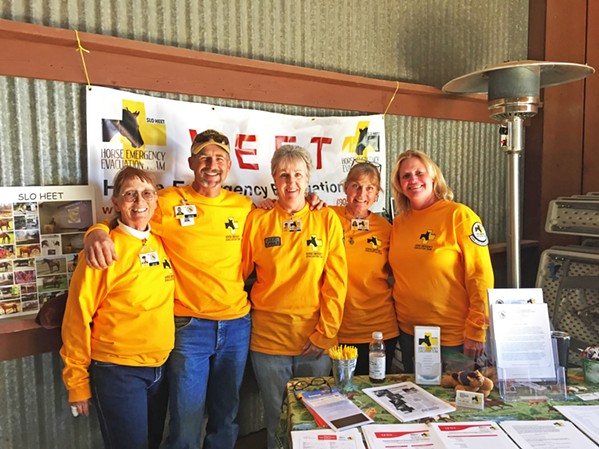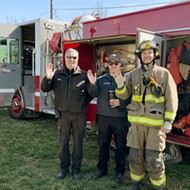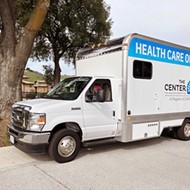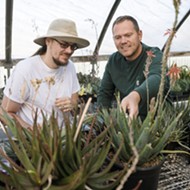SLO HEET provides the community with information on animal care in the event of a power shutoff
By Karen Garcia[{
"name": "Ad - Medium Rectangle CC01 - 300x250",
"id": "AdMediumRectangleCC01300x250",
"class": "inlineCenter",
"insertPoint": "8",
"component": "2963441",
"requiredCountToDisplay": "12"
},{
"name": "Ad - Medium Rectangle LC01 - 300x250",
"id": "AdMediumRectangleCC01300x250",
"class": "inlineCenter",
"insertPoint": "18",
"component": "2963441",
"requiredCountToDisplay": "22"
},{
"name": "Ad - Medium Rectangle LC09 - 300x250",
"id": "AdMediumRectangleLC09300x250",
"class": "inlineCenter",
"insertPoint": "28",
"component": "3252660",
"requiredCountToDisplay": "32"
}]
Heidi Goetz is part of the all-volunteer run Horse Emergency Evacuation Team of San Luis Obispo County (SLO HEET). The nonprofit held a public meeting on Oct. 19 to give the community information and resources about how to prepare for a multi-day power shutoff for not only themselves but for their horses as well.
"If there's a power shutoff, nobody can help. We're all in it for protecting our own," Goetz said.
SLO HEET is a member of Volunteer Organizations Active in Disaster, working with the Red Cross, Cal Fire, and other public service groups within SLO County.
Its volunteers are trained to evacuate and shelter horses during a disaster—including wildfires, an overturned trailer with horses inside, or abandoned horses. SLO HEET also helps law enforcement respond to large-animal incidents.
But the nonprofit can't respond to a multi-day power shutoff unless a fire is approaching a home or ranch that houses horses. Goetz said that like everyone else, volunteers won't be able to get fuel from gas stations to make it to a person calling for assistance. However, if there's a fire threat during the shutoff, she said volunteers would drop everything to help.
During the Oct. 19 meeting, HEET member Karen Jones said residents should start thinking about a plan for themselves and their animals. The first step is to assess the situation and determine whether sheltering in place or evacuating is best for their needs.
As part of preparedness, community members should have a reserve of dry food and water. Horses consume about 10 to 15 gallons of water per day, so filling up extra water storage tanks or other storage containers should work.
Steve Crawford, a PG&E Public Safety Specialist, also spoke at the meeting. He talked about safety precautions related to downed power lines. If someone sees a downed power line, he said, keep yourself and your animals away from it.
If a power line touches your car, don't get out—the rubber on the tires prevents electrocution. Call 911 and wait for help. If you need to exit the vehicle, he said, the person should jump out of the car, without touching anything, and position their feet together.
Cal Fire Incident Command Battalion Chief George Wong spoke about the importance of HEET in response efforts. HEET members are not only trained and certified to evacuate and shelter horses, but they also have licenses to use ham radios in order to communicate with Cal Fire and other fire agencies.
With this tool, Goetz said, everyone knows his or her role in the evacuation.
"We need to know where you are, understand whom we're working with, and who's in charge," she said.
In the event that a power shutoff leads to a fire threat and ultimately an evacuation, HEET members are prepared, Goetz said.
Part of their training is calming a horse down in a stressful situation.
"You do that by body language. You have to take a deep breath and kind of go inside yourself and lower your energy," she said.
The inward calmness is then outwardly projected to the horse, Goetz said, and the horse picks it up and relies on a HEET volunteer as their leader to safety.
To learn more about SLO HEET and their tips for multi-day power shutoffs and evacuation practices, call (805) 466-7457.
Fast fact
The Arroyo Grande Community Hospital's 2019 Golf 'n' Grub and Monarch Memorial Golf tournaments raised a combined total of more than $116,000 to benefit programs and services at the hospital. The 12th annual Golf 'n' Grub tournament raised more than $91,000 to benefit the Legacy Campaign, which includes expanding the hospital's emergency department capacity, advanced imaging technology, enhancements to the Acute Rehabilitation Center, and expanded cancer care services. The $25,000 from the Monarch Dunes Memorial Golf Tournament supported the Cancer Care Fund. To learn more about the event, visit the news and events tab on the hospital's website at supportarroyogrande.org. Δ
Staff Writer Karen Garcia wrote this week's Strokes and Plugs. Send tidbits to [email protected].










